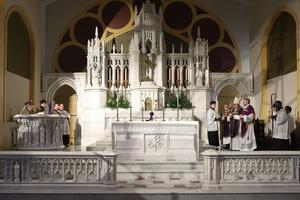‘You Were Ransomed ... With the Precious Blood of Christ’
User’s Guide to Sunday, April 26

Sunday, April 26, is the Third Sunday of Easter. Mass readings: Acts 2:14, 22-33; Psalm 16: 1-2, 5, 7-11; 1 Peter 1:17-21; Luke 24:13-35.
When I first began studies in the seminary, I had never heard of an “encyclical letter” before, and after reading one from Pope St. John Paul II, I was puzzled as to why it was called a letter at all. In contrast to any letter that I had ever sent or received, which were always correspondences with a single person or entity, this encyclical read like a formal theological document addressed to no one in particular. Eventually, I would learn that an encyclical is a letter insofar as it is addressed to the whole Church, but it is also a formal document communicating truths about Catholic doctrine; and for that reason, it is intended especially for the patriarchs, primates, archbishops and bishops who are in communion with the Holy See. Now, I mention this because knowing what an encyclical letter is can aid in our understanding of the second reading today.
In a sense, 1 Peter is a kind of “encyclical,” because, in it, Peter addresses not one specific community of believers, as Paul was accustomed to do, but the whole Church. Further, he was concerned about instructing the nascent Church on a couple of important points of belief about God.
Most importantly, Peter calls everyone in his audience to remember that they have all been redeemed from a futile way of life by the Precious Blood of Jesus Christ, and not by any perishable thing like silver or gold (1 Peter 1:18-19). Peter wants them always to remember that they were ransomed by the Blood of Christ and that it alone has the power to save.
To drive home this point, Peter uses imagery from the Exodus as well as the cultic life of Israel. On the one hand, Peter teaches that the Blood of Jesus is a kind of memorial when he compares Jesus’ Blood to the blood of a lamb; by doing so, he evokes the paschal sacrifice (Exodus 12), which was a sign that reminded the Israelites of their deliverance from Egyptian captivity by God. On the other hand, Peter teaches that the Blood of Jesus is efficacious. He does this by drawing on the language of cultic sacrifice in Israel (Leviticus 3-5, 14); whereas in the old dispensation a person needed to be ransomed from sin and impurity by the blood of a lamb (or its equivalent price) in order to rejoin the people, the Blood of Christ created a new dispensation of grace through which all people could be united to himself in perpetuity.
Given the fact that Christ’s Blood alone has this power, it would be absurd for anyone to have recourse to anything else for salvation. This is why Peter encourages his audience to meditate upon the power of the Blood of Christ over and against their former “futile” ways of life. In addition, Peter admonishes his readers regarding their daily conduct. Yet he does so not by invoking Christ, but the privilege of making supplication to the Father, “who judges impartially according to each person’s works” (1 Peter 1:17). The implicit understanding here is that being united to Jesus Christ through the power of his Precious Blood also means being brought into relationship with the Father and the Holy Spirit. It is through Christ’s blood that all are able to enter in to a personal relationship with the triune God.
Now, we also have been given a share in the divine life of the Trinity through this same Precious Blood of Jesus. As such, we ought to heed Peter’s admonition to conduct ourselves “with reverence” during the time of our “sojourning,” i.e., our earthly lives, by fulfilling the greatest commandment: to love God above all things and our neighbors as ourselves.
Dominican Father Jordan Schmidt is an instructor in sacred Scripture
at the Pontifical Faculty of the Immaculate Conception
at the Dominican House of Studies in Washington, D.C.
















